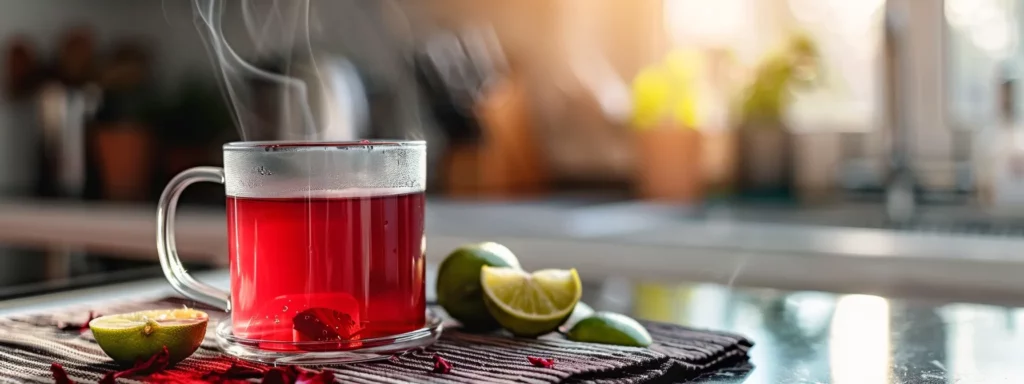The Hidden Advantages of Hibiscus Tea Explored

Advantages of Hibiscus Tea for Health and Wellness
Are you struggling with low energy or searching for simple ways to boost your health? Hibiscus tea contains impressive nutritional properties that many overlook, yet its benefits make it worthy of attention. The post covers how antioxidants in hibiscus tea help with blood pressure and lipid profiles, while also supporting liver health. This information can help you make informed choices about your daily beverage routine.
Key Takeaways
- hibiscus tea offers a natural boost with essential vitamins and antioxidants
- it helps manage blood pressure, cholesterol, and overall metabolic function
- traditional remedies meet modern wellness in every refreshing cup
- natural compounds support immunity and assist in liver detox routines
- daily inclusion aids overall vitality and healthy lifestyle choices
Understanding the Nutritional Profile of Hibiscus Tea

Hibiscus tea stands out for its unique blend of key nutrients, supporting metabolism, skincare, and relief from constipation. This beverage offers clear advantages of drinking hibiscus tea with benefits that may help reduce certain disease risks, setting it apart from other herbal blends and featuring roots in traditional medicine. The following sections detail these aspects further.
What Makes Hibiscus Tea Unique
Hibiscus tea stands out as a favorite among drinkers thanks to its vibrant flavor and impressive nutritional profile, which includes vitamin c and compounds that help reduce oxidative stress. Its unique blend works well to ease stress while the strain used in its creation offers a practical alternative to traditional tea bag methods for health-conscious consumers.
This brew offers a smooth integration of benefits ideal for daily wellness routines, supplying natural support through its distinct ingredients. Many appreciate how a simple cup can address issues like stress and provide a healthy dose of vitamin c to support overall vitality, making it a go-to option for improving modern lifestyles.
Key Nutrients and Their Benefits
The nutrient profile of hibiscus tea includes essential vitamins and antioxidants that support overall health and serve as a useful dietary supplement to complement any meal; its active ingredients not only help manage calorie intake but also offer gentle support during pregnancy and reduce the risk of minor allergy responses:
| Nutrient | Benefit |
|---|---|
| Vitamin C | Boosts immunity and provides antioxidant support |
| Antioxidants | Helps fight oxidative stress and supports metabolic processes |
| Phytonutrients | Assists in managing calorie balance and relieving allergy symptoms |
Each cup of hibiscus tea supplies natural compounds that work as a dietary supplement, fitting well into everyday wellness routines; users benefit from its balanced composition, which proves useful for maintaining a healthy calorie intake, easing mild allergy symptoms, and adding a refreshing twist to a nutritious meal plan during pregnancy.
Comparing Hibiscus Tea to Other Herbal Teas
Compared to other herbal varieties, hibiscus tea offers a lively alternative with a refreshing twist that distinguishes it from black tea in taste and benefits. The natural antioxidant properties combined with essential iron levels contribute to the advantages of hibiscus tea, helping users enjoy a flavorful cup infused with wellness in every sip.
The drink delivers a pleasing burst of juice that not only refreshes the palate but also supports overall health. By choosing hibiscus tea, consumers tap into a beverage that stands out for its unique nutritional blend, providing noticeable advantages of hibiscus tea as a smart addition to their daily routine.
The Role of Hibiscus in Traditional Medicine
The role of hibiscus in traditional medicine is well documented as an influential herbal tea that supports historical practices. Its extract has been used for ages to help soothe various ailments, and recent interest in jamaica flower benefits has shown promising support for modern wellness trends, as accepted by certain food and drug administration standards.
Traditional use of hibiscus, often prepared with a simple infuser at home, has left a lasting impact on health practices across cultures. The readily available extract of this vibrant ingredient continues to offer practical benefits, connecting past remedies with today’s search for effective and safe natural solutions.
The nutrients set the stage for a deeper look into nature’s defenses. Now, the tea’s antioxidants step in to protect and revitalize.
Harnessing the Antioxidant Power of Hibiscus Tea

Hibiscus tea packs a natural punch with polyphenol antioxidants that support digestion, ease headache discomfort, and help with premenstrual syndrome. Its benefits complement rooibos, promoting cellular health and countering oxidative stress. This section shares practical insights on how antioxidants influence overall health and maintain healthy cells.
The Impact of Antioxidants on Overall Health
The antioxidants in hibiscus tea provide a natural boost that supports overall health by promoting balanced blood circulation and reducing inflammation. This powerful brew works well when combined with a dash of honey, offering benefits that complement routines in skin care and enhance the body’s natural resilience without the need to boil excessive amounts of water.
Hibiscus tea delivers bioactive compounds that help combat free radicals, which supports the body’s natural defenses and contributes to a more vibrant look in skin care routines. The infusion of antioxidants, combined with the gentle sweetness of honey, creates a refreshing drink that can positively influence blood flow and overall health in a practical, everyday way.
How Antioxidants Help Combat Oxidative Stress
The antioxidants in hibiscus tea work actively to combat oxidative stress, helping to lower pressure on the body’s defenses and promote overall wellness while leaving room for the simple pleasures like a cookie break. This approach is similar to adding a hint of ginger for extra flavor, much like incorporating a mineral boost into an everyday routine:
| Component | Benefit |
|---|---|
| Ginger | Provides a spicy twist that revitalizes the body |
| Cookie | Offers comfort and a small energy boost |
| Mineral | Supports natural body functions |
| Collagen | Helps maintain skin firmness and tone |
| Pressure | Reduces strain on the immune system |
The natural compounds in hibiscus tea deliver a practical way to reduce oxidative tension while supporting the body’s normal functions, much like a balanced blend of ginger and collagen fortifies one’s daily routine. This thoughtful mix of key elements guides consumers to enjoy a beverage that is not only refreshing but effectively manages stress and supports enriched health practices.
Hibiscus Tea and Cellular Health
Hibiscus tea supports cellular health by supplying antioxidants that help protect each cell from daily stress, much like a nutrient-rich leaf can fortify a plant. Its benefits extend to promoting a healthy stomach and providing subtle relief for issues like dermatitis, which some find comparable to the soothing effect of a cooling cream during menopause:
| Component | Advantage |
|---|---|
| Antioxidants | Support cell regeneration and protection |
| Leaf Extracts | Enhance overall vitality and immunity |
| Phytonutrients | Help maintain a healthy stomach and skin |
| Natural Balancers | Assist in easing menopause symptoms through biochemical support |
Experts note that regular consumption of hibiscus tea contributes to maintaining optimal cellular functions, with its active compounds acting much like nature’s own cream to soothe the skin and lessen irritation. This beverage, paired with a balanced diet, offers a practical option for those seeking to manage menopause symptoms and support overall wellness, making it a smart addition to daily routines.
Hibiscus tea doesn’t just fight free radicals; it works hard to keep the heart steady. The next section shows how it can calm blood pressure while adding a smooth flavor to life.
The Effects of Hibiscus Tea on Blood Pressure

This section reviews how hibiscus tea helps manage blood pressure, explaining the mechanisms behind regulation and citing research studies. It discusses the role of key ingredients such as acid that aids brain function and serve as therapy, highlighting the benefit of hibiscus drink. Practical tips on incorporating hibiscus tea into daily routines follow.
Mechanisms Behind Blood Pressure Regulation
Research shows that hibiscus tea can help regulate blood pressure by acting as a natural diuretic, which supports the removal of excess fluids from the body and aids in reducing strain on the heart. This mechanism promotes better cell function, balancing factors like glucose levels and overall cardiovascular health.
Experts suggest that the antioxidants in hibiscus tea may help improve the elasticity of blood vessels, ensuring a smoother flow of blood and optimal cell performance. Its use as a diuretic and its influence on glucose management provide a practical benefit, making hibiscus tea a smart choice for those looking for a natural way to manage blood pressure.
Research Studies Supporting Hibiscus Tea for Blood Pressure
Recent research indicates that hibiscus tea may help manage blood pressure effectively, with studies showing that the natural compounds in hibiscus tea, along with hibiscus leaves benefits, promote improved blood vessel function. Findings compare the plant’s effects to those seen with cranberry consumption, highlighting a radical shift in natural remedies, and support its use even when addressing issues like bronchitis:
| Component | Observed Benefit |
|---|---|
| Hibiscus Leaves Benefits | Improved blood vessel elasticity |
| Cranberry | Enhanced cardiovascular support |
| Plant Extracts | Balanced blood pressure levels |
| Radical Compounds | Reduction in inflammation |
| Bronchitis | Support in respiratory relief |
Experts have noted that incorporating hibiscus tea as part of a balanced daily routine may offer a practical solution for those seeking natural ways to manage blood pressure. The blend of active plant compounds works in tandem with ingredients like cranberry to provide comprehensive support, making hibiscus tea a straightforward option for people looking to improve their overall wellness.
How to Incorporate Hibiscus Tea Into Your Daily Routine
Integrating hibiscus tea into a daily routine is straightforward and refreshing, as it is often enjoyed as iced tea for a cool boost during warm days. Experts note that the anthocyanin present in hibiscus tea can support immunity and weight management, and its popularity in regions like Africa highlights its long-standing role in nurturing wellness.
Practitioners recommend replacing one beverage each day with a cup of hibiscus tea to help manage blood pressure naturally while supporting overall health. This approach offers a practical solution for those aiming for better weight management, improved immunity, and a taste reminiscent of iced tea enjoyed on a sunny afternoon.
Blood pressure finds its calm, much like the stillness before a new dawn. The next step looks at how a warm cup of hibiscus may smooth out rough edges in lipid numbers.
Improving Lipid Profiles With Hibiscus Tea

Hibiscus tea may help reduce cholesterol risks by improving lipid profiles. Insights include understanding cholesterol, evidence linking hibiscus tea to lower levels, and practical tips for heart health. The content covers cholesterol basics, the role of magnesium, water intake, body mass index, cooking tips, and managing inflammation, ensuring a clear, accessible guide for daily wellness.
Understanding Cholesterol and Its Risks
Cholesterol is a fat-like substance that plays a significant role in heart health and overall wellness, and experts advise consulting a dietitian for personalized insights. Past practices in traditional medicine have noted the impact of high cholesterol on conditions such as hypertension and have explored how exercise and nutrient balance help manage levels.
Understanding the risks associated with cholesterol is vital for preventing issues related to estrogen imbalance and cardiovascular stress, making routine exercise and careful diet choices key. Achieving a balanced lifestyle can involve several practical steps, such as:
- Scheduling regular consultations with a dietitian
- Incorporating moderate exercise into daily routines
- Utilizing traditional medicine insights for holistic health
- Monitoring blood pressure to manage hypertension risks
- Adjusting estrogen levels through dietary adjustments
Evidence Linking Hibiscus Tea to Lower Cholesterol Levels
Studies indicate that hibiscus tea supports a healthier cholesterol balance, which some experts compare to choosing a natural alternative to certain drug therapies. The blend of antioxidants in the tea not only adds a unique taste but also may help reduce acne flare-ups and address issues related to kidney disease, providing potential benefits observed in research conducted in places like Mexico.
Recent findings suggest that regular consumption of hibiscus tea contributes to managing cholesterol levels effectively. Observations indicate that the drink’s natural compounds offer a practical option for those looking to avoid harsh drug side effects, making it a favored choice among individuals concerned with both skin clarity and kidney health.
Practical Tips for Using Hibiscus Tea for Heart Health
Experts point out that incorporating hibiscus tea into a daily routine can provide heart health benefits by reducing the risk of high cholesterol and supporting natural detoxification. This approach, influenced by practices dating back to ancient egypt, also aids hormone balance and boosts cell growth for overall energy.
Health enthusiasts are finding that a mindful cup of hibiscus tea helps maintain a steady heart rate and contributes to cholesterol management, while the natural ingredients work on hormone regulation and detoxification. Observations suggest that its consistent use may improve cell growth, making it a practical option for those keen on lowering cardiovascular risk.
Hibiscus tea sharpens the heart by balancing lipid levels. Next, it quietly helps keep weight steady, inviting a closer look at its gentle support in weight management.
Promoting Weight Management Through Hibiscus Tea

The section breaks down how hibiscus supports metabolism, reviews studies linking hibiscus tea to weight loss, and shares practical teapot recipes for a balanced diet. It highlights ways to reduce excess sugar while supporting healthy bacteria, offering clear insights for those looking to manage weight naturally. This quick guide sets the stage for deeper tips and evidence.
How Hibiscus Tea Affects Metabolism
Hibiscus tea supports metabolism by introducing natural enzymes that help break down nutrients more efficiently, which can lead to better energy levels throughout the day. Experts note that the tea’s unique blend, with a hint of orange flavor and low caffeine content, works well to boost the immune system while reducing the load on the liver.
The beverage provides a gentle metabolic lift, allowing the body to process compounds with ease thanks to its active enzymes. Many find that incorporating a warm cup of hibiscus tea into a daily routine creates a practical improvement in overall health, making it a refreshing choice for those mindful of their metabolism and wellbeing.
Studies on Hibiscus Tea and Weight Loss
Recent studies show that the benefit of drinking hibiscus tea can support improved nutrition and weight management, as its natural compounds seem to aid metabolism and help balance weight when used alongside medication. This research points to a practical option for people looking to manage their weight and boost wellness through a simple dietary addition:
| Component | Impact |
|---|---|
| Antioxidants | Support metabolism and weight control |
| Calcium | Contributes to strong bones and overall nutrition |
| Natural Compounds | Assist in effective weight management |
Further investigations indicate that including hibiscus tea in one’s routine can deliver a pleasant boost in nutrition along with the benefit of drinking hibiscus tea to manage weight effectively. Experts note that its low caffeine content and natural calcium support work well with existing medication plans, offering a simple, practical solution for better daily wellness.
Creating Hibiscus Tea Recipes for Weight Management
Creating hibiscus tea recipes for weight management begins with experimenting by adding a twist from different natural sources, such as a subtle bud extract, a squeeze of fruit juice, and a hint of ground seed for added texture:
| Ingredient | Benefit |
|---|---|
| Bud Extract | Provides a delicate flavor and natural aroma |
| Fruit Juice | Boosts vitamins and adds a tangy touch |
| Ground Seed | Offers texture and supports metabolism |
| Bone Broth | Enhances mineral content for strong structure |
| Skin Cancer Preventive Compounds | Stars in research for supporting skin health |
Creating these recipes allows enthusiasts to tailor their drink by mixing hibiscus tea with ingredients like a touch of bone broth for mineral support or adding fruit components that come with natural defenses against skin cancer, which helps balance flavor with therapeutic benefits while addressing everyday nutritional needs.
Hibiscus tea offers a simple path to a healthier body. It now turns its focus to championing liver care, inviting the reader to learn more.
Supporting Liver Health With Hibiscus Tea

Hibiscus tea supports liver detox by aiding natural cleansing processes. Research shows the tea’s vitamin content may help ease insulin resistance. Registered dietitians suggest pairing it with a squeeze of lime for added benefit. Practical tips on liver function and maintenance follow in the upcoming sections.
The Role of the Liver in Detoxification
The liver acts as a natural filter, removing harmful substances that affect overall wellness. It works actively to regulate cholesterol and blood lipids while easing fever symptoms, making it an essential part of the detox process when combined with supportive beverages like hibiscus tea with a hint of lemon.
This natural system manages toxins by breaking down complex lipoprotein compounds, ensuring that detoxification is efficient and supportive of daily health routines:
| Function | Benefit |
|---|---|
| Cholesterol Regulation | Helps maintain balanced blood lipids |
| Fever Management | Supports body temperature through detox pathways |
| Lipoprotein Breakdown | Aids in efficient detoxification |
| Lemon Infusion | Boosts detox benefits when paired with hibiscus tea |
The liver’s role in detoxification is also evident in its ability to process and eliminate toxins, improving overall health and supporting balanced blood lipids. This function results in a practical way to lower cholesterol naturally and maintain a harmonious internal environment, which is beneficial for those managing fever and general wellness.
Benefits of Hibiscus Tea for Liver Function
Hibiscus tea offers beneficial support for liver function by aiding natural detox processes and helping reduce steatosis risk. This drink, featuring effective roselle properties, also delivers a steady boost in energy that complements daily wellness routines:
- Supports efficient detoxification
- Helps lower steatosis risks
- Boosts energy levels
- Complements breastfeeding nutrition
- Incorporates beneficial roselle extracts
Experts observe that adding this drink to a daily routine serves as a practical step toward improved liver health, especially for those in the midst of busy lifestyles. Its natural benefits during breastfeeding and daily energy support make hibiscus tea a smart, enjoyable choice for overall wellness.
Tips for Maximizing Liver Health With Hibiscus
Experts suggest adding a dash of natural syrup to hibiscus tea for a smooth taste while maximizing liver health. The beverage offers a refreshing way to ease fat buildup and lower triglyceride levels, making it a practical choice for individuals watching their concentration on overall wellness.
Many recommend integrating hibiscus tea into daily routines to help manage inflammation associated with rheumatoid arthritis. This straightforward method not only supports liver detoxification but also brings an added benefit by maintaining a balanced level of fat and triglyceride, all while ensuring a pleasant taste experience.
Hibiscus tea has long been a trusted partner for liver care. Now, its role in battling cancer draws curious minds, inviting further exploration.
Potential Anti-Cancer Properties of Hibiscus Tea

Recent research evaluates hibiscus tea’s potential to reduce cancer risks by targeting specific compounds that may inhibit tumor growth. Studies with animal models and observations related to type 2 diabetes, metabolic syndrome, and sleep patterns, as well as protein balance, provide valuable insights. Experts suggest using this brew as a preventive measure for overall health and wellness.
Overview of Research on Hibiscus and Cancer
Recent studies show that hibiscus tea has potential anti-cancer effects, with ongoing research exploring its influence on prostate cancer risk factors and other conditions like asthma. Researchers also note that regular consumption of this beverage may help manage fatigue, sparking interest in its use as part of a balanced recipe for wellness:
- Reduces inflammation linked to cancer risk
- Aids in managing risk factors for prostate cancer
- Offers relief for symptoms of asthma
- Helps counteract fatigue
Experts appreciate the practical benefits hibiscus tea may offer in reducing disease risks and supporting daily routines, which makes it an attractive addition to any health-focused lifestyle. The evidence suggests that integrating this beverage into a regular diet may prove beneficial for managing not only cancer risk but also other factors affecting overall well-being.
Compounds in Hibiscus That May Inhibit Cancer Growth
The compounds in hibiscus offer potential in blocking cancer growth while also addressing common issues like indigestion and blood pressure concerns. The spectrum of bioactive ingredients, sometimes consumed as a powder or when steeping fresh hibiscus, provides practical support similar to traditions rooted in ancient Egypt, which valued this brew for its wellness properties.
Research suggests that certain natural elements in hibiscus may interfere with cell proliferation, presenting a promising complementary approach to managing health risks. Users appreciate how the simple step of adding hibiscus tea to their routine, whether consumed as a powder blend or steeped as a traditional infusion, can work in tandem with efforts to balance indigestion and blood pressure.
How to Utilize Hibiscus Tea as a Preventive Measure
Experts suggest that regular consumption of hibiscus tea can serve as a preventive measure when combined with a balanced diet that includes green tea, offering a practical strategy for those focused on weight loss and overall health. The infusion works well as part of a daily routine to provide vital antioxidants and support natural wellness practices.
Health enthusiasts note that adding hibiscus tea to a lifestyle that embraces green tea and weight loss goals can help maintain cellular health and reduce oxidative stress. This simple approach helps individuals enjoy a refreshing beverage that supports preventive care and improves overall well-being.
Hibiscus tea shows secrets beyond cancer care. Its qualities now turn toward bolstering the body’s natural guard.
Enhancing Immunity With Hibiscus Tea

Hibiscus tea supports a balanced immune system while offering a refreshing way to add practical wellness benefits to daily routines. It helps boost natural defenses and provides actionable tips for enjoying this flavorful infusion. The following insights reveal the tea’s role in a strong immune system and how to incorporate it for optimal immune support.
The Importance of a Strong Immune System
Maintaining a strong immune system is a key aspect of overall health, and hibiscus tea offers a tasty way to support natural defenses. Experts note that individuals who enjoy hibiscus tea as part of their daily routine often experience boosted immunity, allowing them to better manage daily stress and common illnesses.
The natural compounds in hibiscus tea work to strengthen the immune system while offering a refreshing beverage option. Health enthusiasts recognize that regularly including this brew in their diet provides practical support for wellness, making it easier to sustain energy levels and fight off minor health issues.
How Hibiscus Tea Can Help Strengthen Immunity
Hibiscus tea offers a practical boost to the immune system with its rich antioxidants and vitamin C content, which help fortify natural defenses. Enthusiasts enjoy its smooth flavor while noting its ability to keep everyday ailments at bay.
Regular consumption of hibiscus tea helps minimize stress on the body and supports balanced immunity throughout the day. Experts suggest that including a cup in a daily routine can aid in maintaining overall wellness and a steady energy level.
Tips for Consuming Hibiscus Tea for Immune Support
Hibiscus tea serves as an accessible option for boosting the immune system. Experts recommend consuming one cup in the morning to help support daily defenses and promote overall health benefits:
| Tip | Explanation |
|---|---|
| Morning Routine | Kick-starts the day with natural immune support |
| Natural Sweetener | Add honey to complement antioxidants |
| Consistent Habit | Regular intake aids sustained immune function |
Regular inclusion of hibiscus tea in a daily routine offers a simple way to help maintain a balanced immune system. The practical tips, such as pairing it with a light snack, provide a neat solution to common wellness needs while supporting a healthy immune system naturally.
Conclusion
Hibiscus tea delivers a range of benefits that actively enhance overall health and daily wellness. Its rich blend of antioxidants, vitamins, and natural compounds supports balanced metabolism, improved blood pressure, and boosted immunity. The beverage also aids in maintaining cellular health by protecting against oxidative stress and offering gentle detoxification. Regular consumption of hibiscus tea offers a straightforward addition to a daily routine, empowering individuals to achieve better health outcomes.
